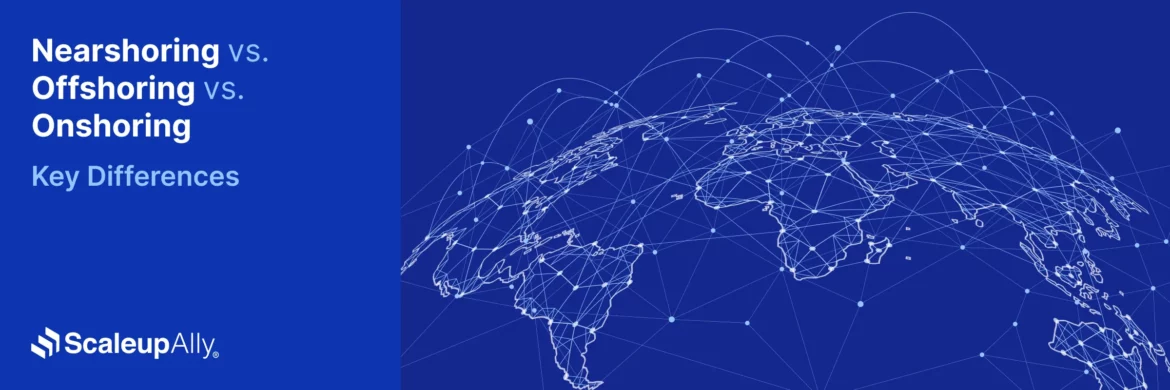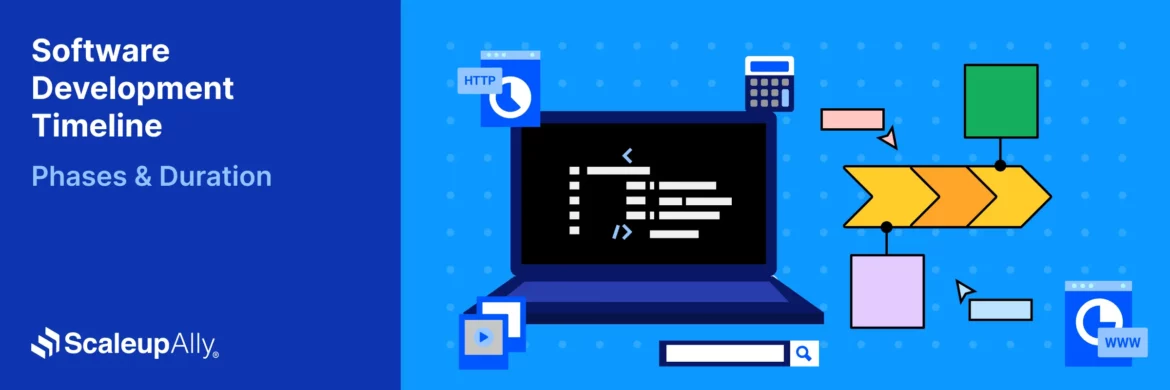![How to Choose a Top-Tier Software Development Company [Step-By-Step]](https://scaleupally.io/wp-content/uploads/2025/05/107.png)
How to Choose a Top-Tier Software Development Company [Step-By-Step]
Suprabhat Sen | May 26, 2025 , 14 min read
Table Of Content
Most businesses don’t fail because they had a bad idea. They fail because they trusted the wrong people to build it.
The wrong software development company can drain your budget, stall your timeline, overpromise, underdeliver, and leave you with an uncompleted product that barely works. The worst thing is that you might not even realize they weren’t the right fit until you’re already neck-deep in contracts, bugs, and excuses.
It’s a frustrating, costly lesson. But it’s avoidable.
In this guide, we will show you how to choose a software development company. The kind that understands your goals and doesn’t vanish after deployment. Step by step, we’ll walk you through the exact filters to apply, the red flags to note, and the right questions to ask.
Before you sign a deal or send an RFP, read this blog. It might save your product. And your sanity.
Key Takeaways
- When choosing a software development company, choose one that best fits your goals, budget, and timeline.
- Evaluate their communication, technical expertise, team structure, and long-term support, and do not look at portfolios only.
- Follow a clear step-by-step process to avoid costly mistakes, from defining your project needs to checking legal agreements.
- Costs vary, but going cheap often leads to lower-quality results and hidden expenses down the line.
- Do your homework. The more informed your decision, the better your chances of building a product that works for your business.
What Factors to Consider When Choosing a Software Development Company?
- What Factors to Consider When Choosing a Software Development Company?
- Steps to Choose the Right Software Development Company
- Common Mistakes to Avoid When Choosing a Software Development Company
- How Much Does Software Development Cost?
- The Importance of Post-Development Support & Maintenance
- Why Choose ScaleupAlly As Your Ideal Software Development Partner
- Conclusion
- Frequently Asked Questions
Over 68% of software projects fail outright or deliver significantly less value than promised. This means that a wrong choice in choosing a software development company will waste your money, derail your entire project timeline, and might set your business back rather than propel it forward.
The following factors will show you what you must consider when choosing a software development company to avoid being another statistic.
1. Technical Expertise and Specialization
If they claim to do everything, do not fall for it. Look beyond their “full-stack” claims. Ask questions about their experience with your required stack. If they have a bit of integrity, they’ll discuss limitations honestly and not promise mastery of every framework ever created.
Statista reports that the most commonly used programming languages in 2024 were JavaScript, HTML/CSS, Python, and SQL. The software development company you choose should be fluent in the relevant ones.
2. Project Management Process
Companies with defined, transparent workflows complete projects on time at nearly triple the rate of those using ad-hoc approaches. So it’s beneficial to be specific about their workflow.
Will they use Agile, Waterfall, or some hybrid? How do they handle scope changes? What project visibility tools will you access? A mature company provides detailed answers without hesitation.
3. Company Culture and Communication
This is a red flag you are most likely to spot in the first interaction. If a company takes days to respond during the sales process, when they’re theoretically most attentive, imagine their responsiveness once they have your money.
Miscommunication causes more project delays than actual coding challenges. Test prospective partners by asking complex questions and evaluating their response time and comprehension quality.
4. Cultural Alignment and Business Understanding
Technical skills alone don’t build successful products. 70% of custom software failures stem from developers lacking contextual understanding of the business problem they’re solving.
Quality developers ask questions about your business model, users, and competitors. Their solutions should reflect your company’s values and goals.
5. Portfolio Depth and Relevance
Anyone can showcase nice interfaces, so you need to dig deeper. For each portfolio piece, ask: What specific problems did they solve? What measurable improvements resulted? How similar was this to your project?
Talk to their past clients directly. A company with truly satisfied customers will eagerly connect you. Those with something to hide offer excuses instead.
6. Financial Stability and Business Longevity
Your software will need maintenance and updates for years. Will this company still exist?
Request basic financial information or proof of sustainable operations. A company that’s been stable for 5+ years with consistent team members means reliability. High developer turnover rates (check LinkedIn history) often indicate internal problems.
7. Security Practices and Compliance Knowledge
Nearly 43% of cyber attacks target small businesses, with custom software vulnerabilities being a primary entry point. Yet many development companies treat security as an afterthought.
Ask specific questions about their secure coding practices, code review processes, and experience with relevant compliance standards (HIPAA, GDPR, etc.). Vague answers here are both disappointing and dangerous.
Steps to Choose the Right Software Development Company
Here, we’ll cover the steps you need to take when choosing a software development vendor:
1. Define Your Project Requirements Before the Search Begins
The single biggest mistake is looking for developers before you know what you need, because project failures can be traced back to requirement misalignment.
Take time to document your needs, which include technical requirements, business goals, budget constraints, and timeline expectations. This foundation makes evaluating how to choose a software development company easier and more objective.
Create a one-page brief that potential partners can quickly digest. This filters out mismatched vendors immediately and sets clear expectations from day one.
2. Research and Create a Shortlist
Google reviews are not enough. Go beyond that and dig deeper. Some businesses remove negative feedback from their websites. This creates a misleading perception of their service quality.
Look at industry forums, GitHub discussions, and LinkedIn comments. Search “[Company Name] problems” or “[Company Name] issues” to find unfiltered opinions. Real insights rarely appear on a company’s own platforms.
3. Validate Technical Claims with Practical Tests
Words are cheap. Proof matters. Ask prospective partners to solve a small, paid test project before committing to the full engagement.
When choosing a software development company, remember that companies that resist proving their capabilities before you sign a major contract are revealing something important about their confidence levels.
4. Examine Their Development Process in Detail
Abstract promises mean nothing. Request specifics about their development lifecycle. How do they handle requirements gathering? What testing methodologies do they employ? How frequently will you receive builds? Don’t settle for vague explanations. Ask to see documentation of their approach.
5. Interview the Team
Who will actually build your software? In a surprising number of cases, the impressive senior developers who sell you the project aren’t the ones who’ll be coding it.
Request detailed information about the specific team members who would work on your project (their experience, specializations, and tenure with the company)..
6. Compare Pricing Structures Intelligently
Price shopping seems logical, but fixating on hourly rates is often misleading. The lowest-priced development bids ultimately cost 30% more on average due to revisions, delays, and quality issues.
When choosing a software development company, evaluate the total cost of ownership. Ask about ongoing maintenance costs, licensing fees, and how they handle inevitable change requests.
7. Evaluate Communication and Workflow
How will you know what’s happening with your project?
Request demonstrations of their project management systems. How frequently will you receive updates? What metrics will they report? How quickly do they respond to questions? Test their communication responsiveness before signing anything.
Common Mistakes to Avoid When Choosing a Software Development Company

Here, we highlight the mistakes you absolutely must avoid when choosing a software development company.
1. Falling for Impossible Promises
When a development company promises everything (perfect quality, rock-bottom prices, and lightning-fast delivery), they’re lying to you. The “iron triangle” of software development (cost, speed, quality) remains undefeated; you can optimize for two, never all three.
The most dangerous red flag is instant agreement to unrealistic timelines or budgets. Quality partners push back on impossible constraints rather than nodding along to win your business.
2. Skipping the Reference Check
Beyond staged testimonials, talk directly with past clients, especially those whose projects resemble yours. Ask the uncomfortable questions: What went wrong? How did they handle setbacks? Would you hire them again?
3. Prioritizing Price Over Expertise
The cheapest bid will cost you the most in the long run. Selecting vendors primarily on price increased total project costs due to rework, maintenance issues, and delayed launches.
Your focus when determining how to choose a software development company should center on value creation, not hourly rates. The question isn’t “How much do they charge?” but “What return will this investment generate?”
4. Ignoring Cultural and Communication Fit
Technical skills alone don’t build successful software. The ability to understand your context, communicate clearly, and adapt to your working style matters just as much. Misalignment between company cultures causes software project failures, more than budget overruns or technical challenges.
5. Misunderstanding the Ongoing Relationship
Software isn’t “finished” at launch. It requires maintenance, updates, and evolution. Yet many businesses choose developers, thinking only about initial development, not the years of partnership ahead.
When figuring out how to choose a software development company, evaluate potential partners as long-term collaborators. What happens after version 1.0 launches? How do they handle support? What are their maintenance terms? The relationship’s sustainability matters more than most realize.
6. Trusting Marketing Over Evidence
Slick websites and impressive claims mean nothing without substance. Request concrete proof: code samples, system architecture diagrams, technical documentation. A truly capable team welcomes technical scrutiny rather than hiding behind marketing language.
7. Overlooking Intellectual Property Terms
Who owns the code you’re paying for? Surprisingly, many businesses never check. Without clear IP assignment in contracts, you might find yourself legally unable to modify your own software without the original developer’s permission.
Before signing anything, ensure complete ownership transfer of all code, documentation, and associated assets. This single oversight has trapped countless companies in costly, restrictive relationships they can’t escape.
How Much Does Software Development Cost?

The answer you hate but need: it varies wildly.
A basic mobile app might cost $30,000-$120,000, while enterprise software often starts at $250,000 and can exceed millions. These ranges aren’t arbitrary and highlight the importance of carefully estimating development cost before committing to a project.
Development rates span from $25/hour for offshore teams to $200+/hour for specialized U.S. firms. While at it, note that 71% of projects exceed their initial budget estimates by an average of 27%.
Maintenance typically costs 15-20% of the original development price annually. Five-year TCO often reaches 2-3× the initial build cost.
Also note that the cheapest option rarely delivers the most value. When evaluating how much to invest, ask yourself what business outcomes this software needs to generate, not just what features it should include.
The Importance of Post-Development Support & Maintenance
The celebration of your software launch is just the starting line, not the finish.
The software you poured months of effort and a substantial budget into begins aging the moment it goes live. Without proper care, it becomes a liability faster than you’d think. Studies show that 21% of the software lifecycle costs occur in the initial deployment phases.
Users discover edge cases that your testing missed. Security vulnerabilities become known. Third-party APIs change without warning. Operating systems update, breaking functionality. The market evolves, demanding new features. Each ignored maintenance cycle compounds these issues exponentially.
Companies that neglect post-launch support find themselves with decaying digital assets that frustrate users and eventually require complete rewrites (essentially paying twice for the same product). When evaluating how to choose a software development company, their maintenance capabilities should weigh as heavily as their development skills.
The most successful software products aren’t necessarily those with the most features at launch, but those that continuously improve through disciplined maintenance cycles. A development partner that understands this lifecycle will save you a fortune in the long run.
Why Choose ScaleupAlly As Your Ideal Software Development Partner
Unlike vendors who overpromise and underdeliver, ScaleupAlly brings technical depth with transparent communication.
Our offshore model delivers enterprise-grade development without enterprise-level pricing, while our dedicated maintenance teams ensure your software evolves with your business needs. When every software decision carries significant risk, our proven methodology increases your odds of success. Contact us today, let’s discuss more.
Conclusion
Choosing a software development company is a strategic decision. The right partner can accelerate your growth, while the wrong one can drain your time, money, and momentum.
You’ve now seen the factors to consider, the steps to follow, and even the costs to expect. But if you’re still not sure how to choose a software development company that truly aligns with your goals, don’t rush it. Your decision deserves depth, not haste.
If you’re serious about getting this right, take the next step and read our detailed guide on Custom Software Development: What is it And Best Practices. It will give you a closer look at how to go about custom software development after you’ve successfully chosen a software development company, so you can stay in control of your investment every step of the way.
Frequently Asked Questions
Q: What questions should I ask a potential software development partner?
Ask about their development process, experience with similar projects, team structure, communication methods, post-launch support, and how they handle delays or changes. Clear answers here can reveal how reliable and transparent they are.
Q: What should I do if my project goes off track?
First, address the issue with your development partner immediately. Review timelines, deliverables, and blockers together. If unresolved, escalate the discussion, revisit the contract terms, or consider bringing in a third-party consultant to realign the project.
Q: How much does it cost to hire a software development company?
Costs can range from $10,000 for basic software to over $500,000 for complex systems. The total cost depends on scope, features, tech stack and location of the development team.
Related Blogs

Nearshoring vs. Offshoring vs. Onshoring: Key Differences
Discover the key differences between nearshoring, offshoring, and onshoring. Learn the benefits, challenges, and how to choose the best outsourcing strategy for your business.
webadmin
Feb 13 ,
6 min read

Top 20 Emerging Technologies of 2026
Discover the top 20 emerging technologies of 2026. Explore which innovations are driving change across healthcare, finance, manufacturing, and other crucial industries.
ScaleupAlly Team
Dec 16 ,
9 min read

Software Development Timeline: Phases, Duration & Estimation Guide
Understand the software development timeline with phase durations, key factors, hidden delays, and practical methods to estimate project time.
Suprabhat Sen
Nov 29 ,
16 min read



